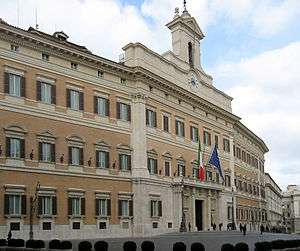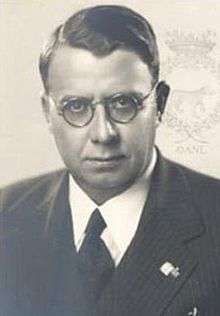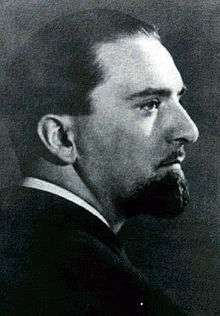Chamber of Fasci and Corporations

Chamber of Fasci and Corporations (Italian: Camera dei Fasci e delle Corporazioni) was the lower house of the legislature of the Kingdom of Italy from March 23, 1939 to August 2, 1943,[1] during the height of the regime of Benito Mussolini's National Fascist Party.
History
It was established on January 19, 1939, to replace the Chamber of Deputies during the 30th legislature of Italy. Members of the chamber were called '"national councilors" (consiglieri nazionali) rather than deputies. The councilors of the chamber did not represent geographic constituencies, but the different branches of the trade and industry of Italy, thus reflecting the corporativist idea of fascist ideology.
Councilors were elected for terms of undetermined length and automatically lost their seats upon their defection from the branch they did represent. Renewal of the legislature was ordered by decree by the King of Italy, on specific instruction of the head of government (Mussolini).
Appointment
The creation of the Chamber of Fasci and Corporations was the culmination of the progressive curtailment of the independence of Parliament dating from Mussolini formally proclaiming a dictatorship in 1926. The elections of 1929 and 1934 were for a single list of Fascist candidates.
No elections took place in Italy between 1934 and 1946. Unlike earlier elections for the legislature held under the Fascist era, popular suffrage was eliminated altogether. Instead, candidates were simply delivered under the pretext of a parliamentary reform, replacing the elections system with a body comprising only candidates of the various corporations of Italy, fulfilling Benito Mussolini's vow of enacting a complete corporativist system.
The candidates for the approximately 600 seats were nominated summarily by three organs: the Grand Council of Fascism of the National Fascist Party (PNF), by the National Council of the members of the PNF, and by the different corporations resembling the entire trade and industry of Italy, canalized through the National Council of Corporations (Consiglio Nazionale della Corporazioni), effectively in the hands of Mussolini and the PNF.
Presidents
| № | Portrait | Name (Born–Died) |
Term of Office | Party | |
|---|---|---|---|---|---|
| 1 |  | Giacomo Acerbo (1888–1969) | 23 March 1939 | 27 June 1939 | National Fascist Party |
| 2 |  | Dino Grandi (1895–1988) | 30 November 1939 | 2 August 1943 | National Fascist Party |
See also
References
- ↑ Minister Calderoli explained the subtle nuances between dissolution of the Camera dei fasci e delle corporazioni and express repeal of its founding law of 1939, never taken place and now required "for cleaning needs of legislative databases": Buonomo, Giampiero (2009). "La Camera dei fasci e delle corporazioni o il Senato regio? Cronaca di un'abrogazione incompleta". Forum di Quaderni costituzionali. – via Questia (subscription required)